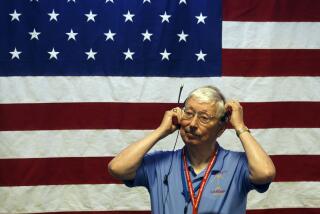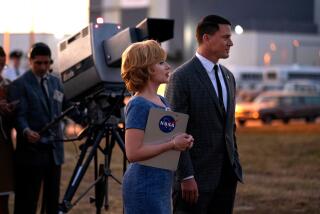A Hero Still Sees the Future in the Stars
- Share via
By the time he made it out to Edwards Air Force Base, the old watering hole called the Happy Bottom Riding Club was history. And he didn’t see Chuck Yeager there either.
And those weren’t the only facts that Hollywood fooled around with.
“My convertible was yellow,” retired Air Force Col. Leroy G. Cooper Jr. says with a grin. “But the red looked good.”
But most of all, astronaut Gordon Cooper still chafes over the way that Hollywood’s version of Tom Wolfe’s “The Right Stuff” raised the question of whether the late Gus Grissom, to use the old test pilot vernacular, “screwed the pooch” after the splashdown of Mercury 2.
“It was totally off on Gus Grissom,” Cooper declared.
I was 5 when Grissom was bobbing in the sea as his capsule sank to the ocean floor. That wasn’t supposed to happen, but the hatch had prematurely blown open--a snafu Grissom blamed on an inexplicable technical glitch. The movie, to Cooper’s dismay, omits the later analysis that vindicated Grissom.
“The thing I like to point out,” Cooper says, “is that Gus would have never been picked for the first Gemini and the first Apollo flights had he goofed up on the Mercury flight.”
*
Gordon Cooper was giving me the right you-know-what. He must have known, when I called him up to request an interview, that I didn’t really want to talk much about the fact that he’s moving his aviation firm from the vicinity of Van Nuys Airport out to Lancaster’s Fox Field, that the old test pilot is going back to the High Desert.
I doubt that I’m the only one who, upon seeing his name in the newspaper, had the same thought.
Gordo!
He was a hero. Thirty years ago last month, Gordon Cooper was the last American to soar into space alone. He recorded 22 orbits on the last and longest of the Mercury missions. The next time he went up, with Charles Conrad Jr. in August, 1965, in Gemini 5, the flight lasted 196 hours, 56 minutes--the first to last long enough for a trip to the moon.
Gordo!
Even to a child, perhaps especially so, the post-Sputnik years were an amazing time. Family legend has it that before I learned to count from 1 to 10, I could count down from 10 to blastoff. Our astronauts--Shepard, Grissom, Glenn, Carpenter, Schirra, Slayton, Cooper--were so bold, so brave, so American.
It was an age of possibility and paranoia. We were racing to the moon and ducking under our school desks. The bad guys had Khrushchev, but we had Kennedy. And, of course, the Magnificent Seven, the youngest being Gordon Cooper.
He told me something I’d never heard before. In 1967, or maybe early ‘68, he and Gen. Curtis LeMay cooked up a plan to end the Vietnam War. They pitched the idea to LBJ.
Cooper, with his heroic credentials, would serve as a special envoy to Hanoi and deliver this ultimatum: Either sit down to talk peace or “we will make Haiphong disappear.” A deadline would be set to allow for an evacuation. If the North Vietnamese didn’t budge, well, too bad. And if that didn’t impress Uncle Ho, Hanoi would be next.
Nukes wouldn’t have been needed, Cooper says. A flock of B-52s dropping high explosives would do the trick.
President Johnson balked. “He said, ‘This is a civil war and we shouldn’t be in it in the first place,’ ” Cooper recalled. There seemed to be no honorable way out. No solution.
Yet within two years, Americans would set foot on the moon.
*
Gordon Cooper was smaller than I expected, and looked older too. I realized he’s 67 now, but somehow figured he’d look the way Dennis Quaid, the actor who played him with such swagger, will look at age 50.
Cooper thinks young, though. It seems he thinks that President Clinton, that would-be Kennedy, should set some new goals: An orbital space station. A science lab on the moon. A mission to Mars.
He’s bullish on space. He preaches the gospel that the program returned huge dividends in microelectronics and other technologies. Think of the work an accelerated space program would provide for those engineers and technicians who lost their jobs in the defense cutbacks. Cooper says we are much better off building space stations instead of bombs and bombers.
I asked him what he’d say to the many doubters, to people who see NASA as a luxury and say money should be spent on earthbound problems. What would he say to people who think that was then, this is now, and we just can’t afford it.
“Well, I think that’s really a pessimistic attitude,” Gordo said.
And President Kennedy, he added, had expressed the same reservations.
More to Read
Only good movies
Get the Indie Focus newsletter, Mark Olsen's weekly guide to the world of cinema.
You may occasionally receive promotional content from the Los Angeles Times.










